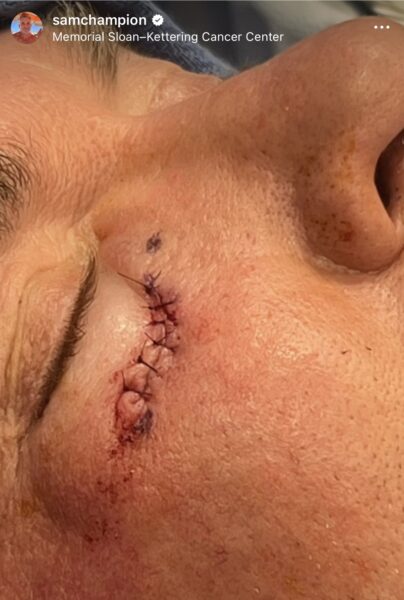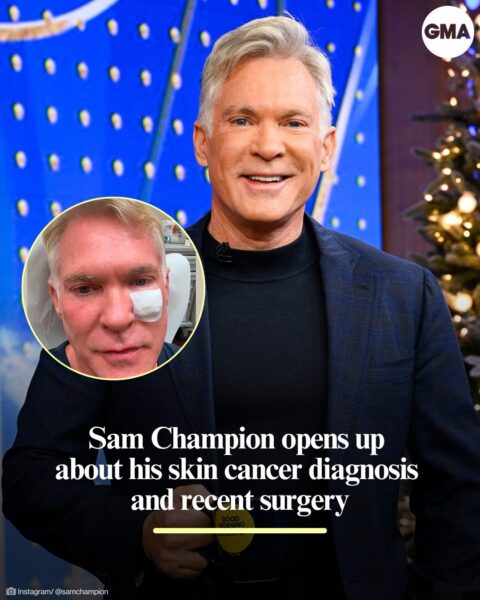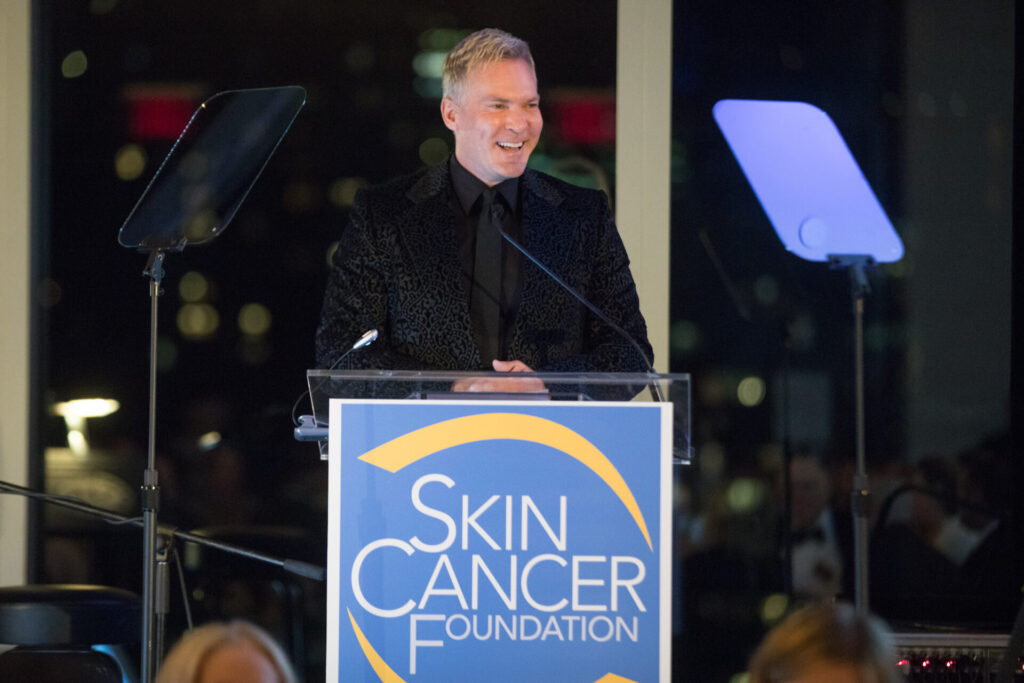Good Morning America host and weather anchor Sam Champion is no stranger to skin cancer. After his first bout with the disease at age 26, Sam has had multiple skin cancers removed and is familiar with the warning signs of the disease. But even he was surprised by the appearance of his most recent basal cell carcinoma (BCC), so he’s speaking up about the importance of regular skin exams, getting to know your skin and trusting your instincts.
In October 2024, Champion took to Instagram and television to share his diagnosis and treatment journey, and to educate his fans about the dangers of skin cancer.
“I’ve battled it [skin cancer] most of my life, and this experience was very different for me,” Sam told ABC7 News, a station for which he also serves as an anchor. He explained that while he noticed the small spot under his eye, he wasn’t expecting it to be a BCC, or that getting it removed would leave him with such a sizeable wound.
Basal Cell Carcinoma Warning Signs
Basal cell carcinoma (BCC) is the most common form of skin cancer, with an estimated 3.6 million cases of BCC diagnosed in the U.S. each year. BCCs occur in the basal cells that line the outermost layer of the skin, and can vary widely in appearance — sometimes they look like an open sore that doesn’t heal and may bleed, ooze or crust; a reddish patch or irritated area; a persistent sore that may appear to heal and then return, or a shiny bump or nodule that is pearly or clear, pink, red or white. BCCs can also be tan, black or brown, especially in people of color, and can even be mistaken for a normal mole. The most important thing to look for is anything new, changing or unusual on your skin.
Sam cites his familiarity with his own skin as the reason he knew the spot should be examined by a doctor. “If you look at your skin on a regular basis, you know what your skin feels like, you know what it looks like,” he said. “You know if something wasn’t there before. If I hadn’t said we need to look at it because I know my skin and I know it’s not right, we may have let it pass for a while.”
The Skin Cancer Foundation recommends everyone see a dermatologist annually for a professional skin exam, and perform monthly skin self-exams to stay on top of any suspicious spots.

Image: Sam Champion on Instagram
Mohs Surgery
Sam underwent Mohs micrographic surgery to have the BCC removed in early October 2024. Mohs surgery is the most effective technique for treating basal cell carcinomas, including those in cosmetically important areas such as around the eyes, nose and lips. Unlike traditional excisional surgery, the Mohs procedure is done in stages while the patient waits. This allows the removal of all cancerous cells for the highest cure rate while sparing healthy tissue and leaving the smallest possible scar.
BCCs generally grow slowly and rarely metastasize (spread) to other areas of the body, but early detection is still paramount for effectively treating the disease. If left untreated, BCCs can grow to be disfiguring and, in highly unusual cases, deadly.
“I don’t want you to think there’s an ‘easy’ skin cancer, because there isn’t,” Sam said, noting that he would be following his doctor’s recommendations for scar care following his surgery.
Educating About Skin Cancer Prevention

Image: Sam Champion on Instagram
In addition to educating his viewers on the importance of early detection, Sam also discusses how you can prevent skin cancer in the first place. The number one risk factor for BCC is unprotected exposure to ultraviolet (UV) rays from the sun or indoor tanning devices. Sam acknowledged that his history of tanning as a young man likely contributed to his many skin cancers, and has become a staunch advocate for always using sun protection.
“These days, I wouldn’t think about going outside without sunscreen,” Sam said. He frequently uses his social media accounts to share sun protection reminders and is a dedicated supporter of The Skin Cancer Foundation (even hosting the Foundation’s annual gala more than once!)
During his latest efforts to educate the public, Sam shared one important final thought: skin cancer can happen to anyone, no matter their age or skin type. “It is everybody’s issue. Skin cancer is a problem for all of us who have skin.”





